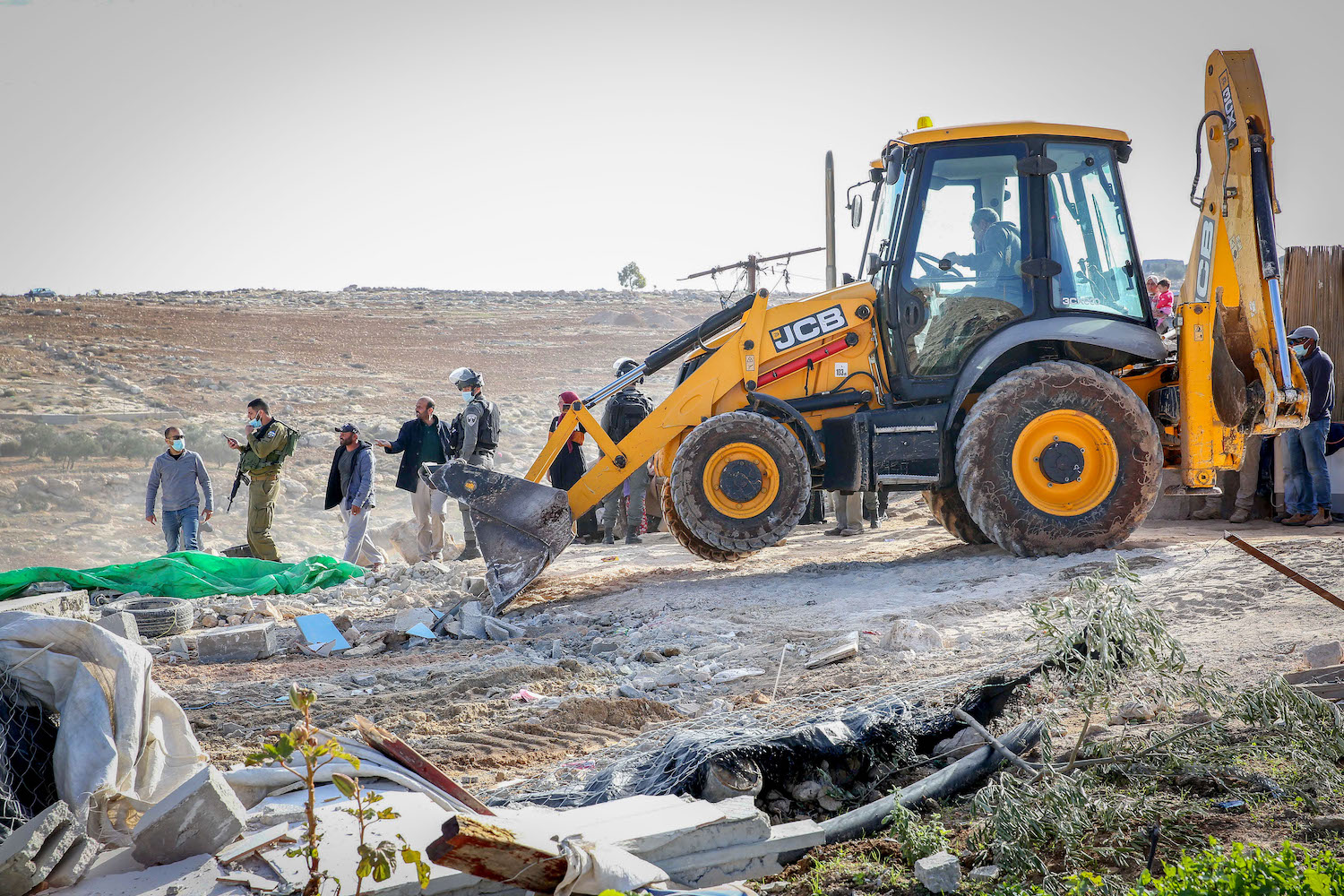In 2020, soon after U.S. President Donald Trump proposed his infamous Middle East peace plan, the Israeli government led by then-Prime Minister Benjamin Netanyahu openly declared its intention to formally annex large parts of the occupied West Bank. Yet despite Netanyahu’s grandstanding, under the weight of domestic and international pressures, such annexation did not materialize.
However, on the eve of Israel’s most radical right-wing government ever, the question arises whether this is about to change. Since the Trump plan, the Israeli right has consistently pushed for what it describes as the “extension of sovereignty” over the West Bank — that is, to deepen and normalize the state’s hold on the territory, without, of course, extending citizenship to the Palestinians living under military rule.
The new coalition agreement between Netanyahu’s Likud party and the extreme right Religious Zionism party, led by Bezalel Smotrich, sheds some light (or darkness, to be more precise) on the government’s planned policy in this context. And while the agreement forsakes, for now at least, formal annexation, the picture that emerges from the deal is equally troubling, if not worse.
To set the scene, a few words about Smotrich. A supporter of the complete annexation of the West Bank without citizenship rights for Palestinians, Smotrich was suspected of attempting to commit terrorism during Israel’s so-called disengagement from Gaza in 2005. He is a staunch supporter of Jewish settlements across the West Bank, which are illegal under international law, including the regularization of outposts on Palestinian private property, which are illegal even according to Israeli law. Within Israel, he has also advocated, in the past, for separation between Jewish and Arab maternity wards, and recently labeled human rights organizations as “existential threats.”

The cold, bureaucratic terms of the new coalition agreement cannot be read without taking into consideration the personalities involved. Put bluntly, the agreement designates Smotrich as the de facto overlord of Area C in the West Bank, which according to the Oslo Accords, is under full Israeli military and civil control pending a “final agreement” with the Palestine Liberation Organization (PLO). Rather than directly annexing the West Bank, the coalition deal provides for an almost separate entity of “Smotrichstan,” if you will, the purpose of which is to deepen the domination of settlers over Palestinians, while diminishing the already scant protections Palestinians have under the occupation.
Two army units under one party
This arrangement is to be carried out by a few seemingly bureaucratic moves, buried in Article 21 of the coalition deal. First, the deal places COGAT and the Civil Administration — the two military units charged with administering the occupation — under the “full responsibility” of Smotrich’s party through a “junior minister” position within Israel’s defense ministry. These two units are in charge of issuing building permits, enforcing planning laws, managing natural resources, providing entry permits for Palestinians into Israel — basically governing all civil life in Area C, both for settlers and Palestinians. COGAT, additionally, is in charge of permits and movement of people and goods between Gaza, Israel, and the West Bank.
Settlers are de facto excluded from much of the units’ jurisdiction; various extraterritorial measures already make settlers subject as individuals to Israeli law, while many military orders that apply specifically to settlements are virtually similar to laws within Israel. Nonetheless, in crucial aspects such as land allocation and administration, the Civil Administration still plays a central role concerning settlers.
By granting the responsibility for these units to Smotrich, the coalition agreement would solidify his ability to use their enforcement powers against Palestinians, while enabling settlers to expand settlements, including on private property, with even greater impunity. Furthermore, through control of COGAT, Smotrich would be able to increase Israel’s pressures on the civilian population in Gaza, including through tightening movement restrictions in and out of the strip. This places millions of Palestinians directly at the mercy of one of the most radical figures in Israeli politics.
Smotrich’s control will be ensured by several measures that are intended to politicize the Civil Administration and quash any potential bureaucratic or legal resistance. First, Smotrich will be granted the power to appoint the heads of both COGAT and the Civil Administration, making sure that only ideological supporters of the settlements would be in charge of the West Bank.

Second, the units will receive legal advice not from the military’s advocate general, as is normally the case, but rather from legal advisers allocated within the defense ministry to Smotrich’s “fields of operation.” While the military advocate general has been hardly effective in protecting Palestinian land rights in the West Bank, it at least concedes formally that its actions are subject to the laws of belligerent occupation, which provide for the protection of Palestinians under international humanitarian law. In all likelihood, Smotrich’s lawyers will not concede even that.
Third, Smotrich will have the power to authorize any legal position submitted to the Supreme Court in response to a petition relating to these issues. This would mean, for instance, that it is highly unlikely that the state will ever concede to the Court that land is privately owned by Palestinians, making it even harder for Palestinians to fight for their cases in an already hostile legal environment.
Uncharted territory
In addition to all this, the coalition agreement contains clauses that seek to ensure the solidification of de facto annexation, and the strengthening of a system based on blunt Jewish supremacy. It designates Smotrich to be in charge of a “project” in which the laws in the settlements would be “adjusted” to reflect the law in Israel (of course, no such measures will apply to Palestinians). In an attempt to deny that this is formal annexation, the agreement clarifies that these adjustments would take place through orders from the West Bank’s military commander.
Here it should be noted that international law requires that the military commander in occupied territories uphold the interests of the local population, and as such, must retain some functional independence from the political apparatus. But with the new arrangement, the commander is transformed into a procedural rubber stamp, existing only as a cover for Israeli politicians to deny accusations that the territory has been annexed.
It is true that the agreement stipulates that all of Smotrich’s powers would be subject to authorization by the prime minister — but this is of no comfort. There is little evidence that Netanyahu is substantially opposed to Smotrich’s ideological agenda, at least regarding the Palestinians.

It also seems unlikely that Netanyahu would have the energy to oppose the much younger and hungrier Smotrich, considering that the incoming prime minister has a key personal interest in preserving his coalition at all costs: he is still standing trial for corruption charges, and is on a quest to weaken Israel’s judiciary in part with this threat in mind. This personal mission is arguably the main driving force behind his astonishing concessions to the most outrageous demands of his coalition partners.
Last, in his agreement with the Jewish Power party — which ran on a joint ticket with Religious Zionism but reverted to separate factions upon entering the Knesset — Netanyahu has designated the openly racist Itamar Ben Gvir, a Kahanist who has been convicted of incitement to racism and support of a terrorist organization, as national security minister. Among Ben Gvir’s unprecedented powers, he will be given control over a border police unit operating in the West Bank, as well as the national police operating inside Israel.
With Smotrich in charge of the Civil Administration, and Ben Gvir in charge of the police forces, the stage is set for a de facto entity in the West Bank controlled by two rampant anti-Palestinian fundamentalists. As such, Palestinians are in clear and imminent danger, even beyond the dire circumstances already at hand. The human rights situation in the West Bank has long been horrific and rapidly deteriorating, but now, we are hurtling into uncharted territories.

